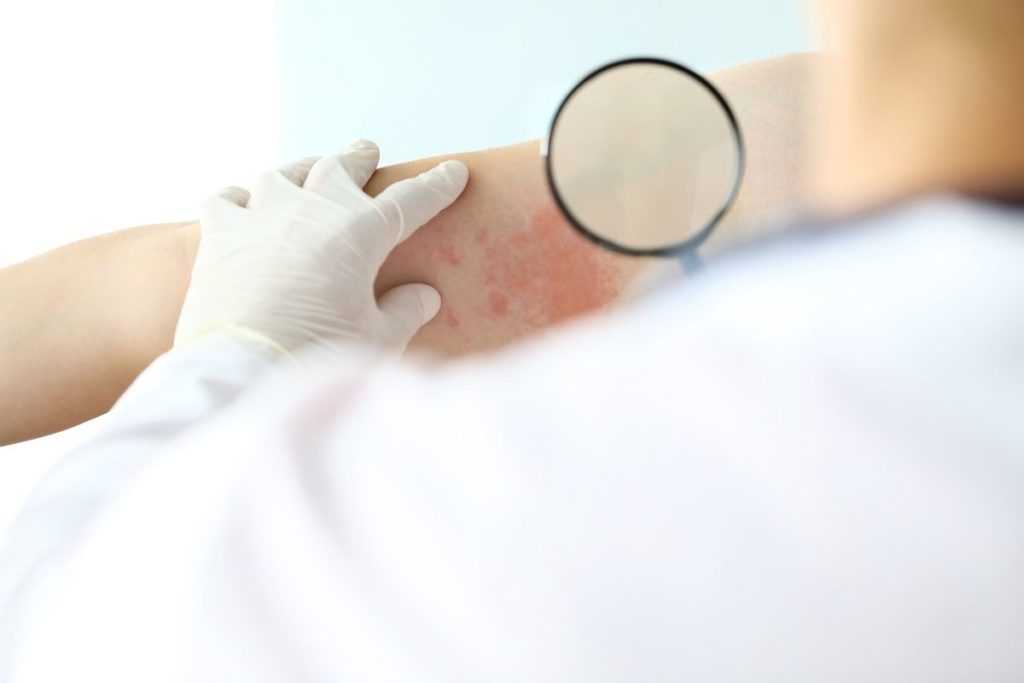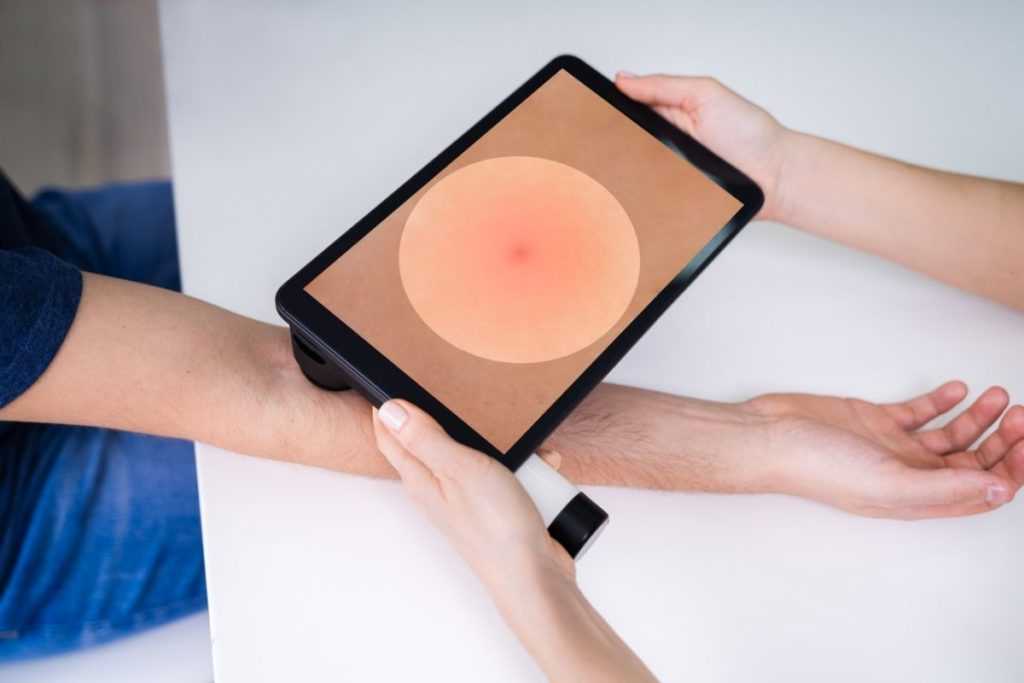Dermatology is the study, research, and diagnosis of abnormal skin, fat, hair, nails, and genital membranes.
Who is a Dermatologist?
Doctors who specialize in skin, hair, and nails are distinguished as Dermatologists. If you have a major skin concern, you should consult a Dermatologist. Dermatology is the science of skin, hair, and nail disorders diagnosis and treatment.
Your skin is your body’s biggest organ. It is a health barrier as well as an impediment to damage and sickness in the body. Unfortunately, most people experience skin problems at some point in their life. Every six visits (15%) to the family physician (GP), a skin problem arises.
The responsibilities of a Dermatologist may be:
- Diagnosis and treatment of skin problems
- Dermatological screening
- Medicine prescription
- Perform modest operations on topical skin abnormalities
- Patient consultation and education in the optimal management of their condition
- Clinical or fundamental research


Dermatologist vs Skin Specialist
A dermatologist is another word for a Skin Specialist. The terms Dermatologist and skin specialist are interchangeable. A Dermatologist is a more formal name for a skin expert.
They generally treat skin illnesses such as tinea, eczema, hair and nail diseases, skin cancer, aesthetic issues, psoriasis, etc. They use therapies such as topical therapy, surgery, radiation, etc. It is critical to note that the word Dermatologist will always be called a professional medical doctor. Skin specialists may not be medical professionals but they have much knowledge and expertise in treating minor skin diseases.
How to become a Dermatologist in Pakistan?
If you ask a Pakistani child about their career ambition, they’d tell you that they want to be a doctor. Becoming a doctor is almost every child’s dream in Pakistan. It is usually among the top three preferences, carrying the same weight as becoming a Fighter Pilot or an Engineer. Getting into MBBS is not a piece of cake in Pakistan. Yet, mostly young Pakistani girls aspire to opt for this noble profession. Thus, we see millions of candidates taking the entry test for MBBS but only a few make it through.


If you wish to become a Dermatologist, you need to go through these 6 phases:
1) Complete your Matriculation with Biology
You need to complete your matriculation (or O’ Level) with Biology. This allows you to have a basic knowledge of human biology. Students who matriculate in the arts or computing are not permitted to take FSC Pre Biology. It is also required for kids to earn excellent grades in Matrto to get admitted to a reputed college.
2) Go for Pre-Medical in FSc
In the second phase, you need Biology again to secure admission at a Medical College. It is compulsory for the A’ Level and FSc students to choose Biology again among other science electives to sit for the test. No student is admitted to a Medical College for further studies if they do not pass the FSc pre-medical exam. Your marks in FSC are the most crucial since they play a vital part in admissions.
3) The Entrance Exam
There are a few medical institutes in Pakistan and students outnumber them. As a result, there is fierce rivalry in this industry. Universities organize admittance tests to choose the top students for the medical profession. If you are from Punjab, you must prepare for and pass the MDCAT. But, if you are from KPK, you must apply for the ETEA examination. These exams are compulsory for entrance to public and some private medical schools. Some medical schools may administer their own entrance exams, or accept the NTS NAT-1 for admission.
4) Applying for a Medical College
After this, whether you are certain of acceptance or not, you must apply for admission to a government or private medical school. Universities perform admission tests before the announcement of results. This is why you must be aware and apply as soon as possible. If the time runs out, you will have to wait for another whole year.
The merit keeps changing every year for a place in medical college. Make sure you study hard and beat the competition!
5) 5 Long Years on MBBS or 4 years in BS Dermatology
MBBS is a double bachelor in medicine and Surgery. It is an acronym for Bachelor of Medicine and Bachelor of Surgery. Candidates who qualify for the entrance exam, secure a position in Medical College based on merit. Some students who can afford the heave fees, go for private admissions. MBBS takes 5 long years to complete. During this time, all students study the core Medicine and Surgery-related subjects to earn a doctor’s title.
The alternate route to becoming a Dermatologist is to opt for the 4-year course. A handful of universities in Pakistan offer an honor’s degree in Dermatology. The degree title is Bachelor of Science (BS) and is equal to 16 years of education. This may cut the voyage short for students aspiring to become Dermatologists.
6) Specializing in Dermatology
After MBBS, doctors go for the College of Physicians and Surgeons (FCPS) Fellowship, specializing in Dermatology. Further qualifications include Clerkships, Diplomas, Advanced Diplomas, MCPS, MRCP, and Certifications in Dermatology.
Those who complete their BS in Dermatology, further go on to pursue master’s degrees. These are usually titled Master of Science and are equal to 18 years of education in Pakistan.


Specializations in Dermatology
Dermatology is the study of skin and skin-related diseases. Although there are several subspecialties within dermatology as well. Some Dermatologists receive complete degrees in general dermatology, while others pursue extra study to develop their knowledge and skill in a specialized field. Those pursuing specialization can pick from one or more of the four primary branches. All four branches are discussed below:
-
Dermatopathology
Dermatopathology is the use of hair, skin, and other tissue samples to merge dermatology with pathology or the investigation and detection of illnesses. In a laboratory, these samples are inspected under a microscope. Dermatopathology enables expert physicians to research and diagnose the causes and consequences of skin, hair, and nail illnesses.
-
Pediatric Dermatology
If a child has a skin, hair, or nail illness, he or she may benefit from seeing a pediatric Dermatologist. Especially if the illness is more commonly identified in children, such as atopic dermatitis. A Pediatric Dermatologist is a doctor who specializes in the diagnosis and treatment of children, particularly newborns and babies.
-
Mohs Surgery
If one has skin cancer, you may be advised to see a Mohs surgeon for treatment. Mohs surgery, which is specialized in the treatment of skin cancer, is performed by a Mohs surgeon. Some Dermatologists even go for fellowships in Mohs surgery.
-
Cosmetic Dermatology
In this dermatological field, Dermatologists use treatments to enhance the look of the skin. Cosmetic dermatology is referred to as such since it is not a required component of good health. Dermal fillers and Botox injections, chemical peels, laser hair removal, and laser treatments to lessen the appearance of scars, wrinkles, and other faults are all options for smoothing fine lines and wrinkles or improving face volume.
Salary of a Dermatologist
According to salaryexplorer, a Physician – Dermatologist in Pakistan, roughly makes around Rs.240,000 PKR per month. Salaries vary from Rs. 110,000 (the lowest) to Rs. 381,000 (the highest). The average monthly salary is Rs. 259,000, meaning that 50% (50 percent) of the physician Dermatology(s) work for less than Rs. 259,000, while the other 50% make more Rs. 259,000.


Mandatory Work Experience and Training to be a Dermatologist
Five years of education, followed by a year in the House. But, the Final Professional Exam takes around 3 months, which is added to that year’s total of 15 months. It is preceded by about two months of application procedure and one year of house job.
Success Stories
Some of the Best Dermatologists in Lahore, based on Marham’s patient satisfaction review percentages are:
1) Dr. Sana Younas
Sana Younas is a Senior Registrar Dermatologist at Surgimed Hospital, Gulberg, IV, Lahore. She earned her MBBS from Fatima Jinnah Hospital and her FCPS from Pakistan College of Doctors and Surgeons. She has been working in this industry for ten years.
She formerly worked at Surgimed Hospital as a Dermatologist. She is currently employed as a Consultant Dermatologist at Chughtai Medical Center. Her specialty includes hair problems, skin issues, and hair loss. Hair loss. Her patient satisfaction rate is 98 percent, and her Marham profile has more than 200 positive reviews.
2) Dr. Zafar Ahmed
Dr. Zafar Ahmed works as a Consultant Dermatologist at Deep Ocean Dermatology, Skin Laser Center in Clifton, Karachi. He received his MBBS from Liaqat Medical University of Health Sciences. His Clinical Research Certified Professional (CRCP) from Dow University of Health Sciences. His Diploma in Dermatology (D. Derm) from the Institute of Dermatology in Thailand. Dr. Zafar also has a Diploma in Dermato-Surgery from the Institute of Dermatology, Bangkok. He has worked in this profession for 24 years.
He has served as an Ex-Consultant at ISM Hospital in Karachi and as a Consultant at Skin Laser Cosmetology Center in Karachi. He is presently employed at Baqai Medical University as an Ex-Senior Registrar. His patient satisfaction rating is 97 percent, and he has received 1450 Marham reviews.
3) Dr. Nadia Arshad Chaudhary
Dr. Nadia Arshad Chaudhary is a Dermatologist at Dr. Nadia Skin Laser Clinic in Islamabad’s Sector-F. Her MBBS is from Lahore University of Health, while her MSc is from Cardiff University, UK. Her MBBS degree is from Lahore University. She’s been working in her area for seventeen years.
She used to work as a consultant for Dr. Nadia Skin Laser Clinic in Islamabad. She is now the Department Head at Islamabad’s International Hospital Quaid-e-Azam. PRP, laser hair removal, skin issues, and Botox are among her specific interests. Her patient satisfaction percentage is 96 percent, and her Marham profile has 248 reviews.
FAQs
How long does it take to become a Dermatologist?
Answer: 9 to 10 years after FSc.
Where do Dermatologists work?
Answer: Dermatologists work in any medical setting, even privately. Dermatologists are employed by hospitals to assist patients during the acute period of skin damage. Dermatologists may be employed on the staff of medical office suites to increase their health care offerings.
What hours do Dermatologists work?
Answer: 30 to 40 hours per week.
Can a Dermatologist help with acne?
Answer: Yes, they can. A Dermatologist can assist you in keeping your acne under control, avoiding other skin damage, and making scars less visible.
Can a Dermatologist help with facial hair?
Answer: Dermatologists provide hair removal services such as laser hair removal and a prescription lotion that can reduce hair growth on a woman’s face. You have alternatives when it comes to eliminating unwanted hair.
Can Dermatologist remove blackheads?
Answer: Acne extraction, when performed by a Dermatologist, is a safe approach to remove blackheads and whiteheads. Dermatologists can also utilize procedures to remove a deep, painful acne cyst or nodule. A Dermatologist will inject a corticosteroid into the spot to do this.
Can a Dermatologist help with hair loss?
Answer: Dermatologists deal in hair loss diagnosis and treatment. A dermatologist can tell you whether your hair loss is due to FPHR or something else.
Can Dermatologists do hair transplant surgeries?
Answer: Dermatologists can conduct hair transplants and can tell you if you are a good candidate for one.
How much does it cost to become a Dermatologist?
Answer: Universities’ educational fees for BS Dermatology range from 80,000 to 170,000 every semester on average. However, a specialization after MBBS may vary from one medical institute to another.
If you find this detailed guide on “How to become a Dermatologist in Pakistan” helpful, don’t forget to share with the community around you. Book an appointment or consult dermatologists online, in your area, with Marham. We are here to help you with all your dermatological needs.

